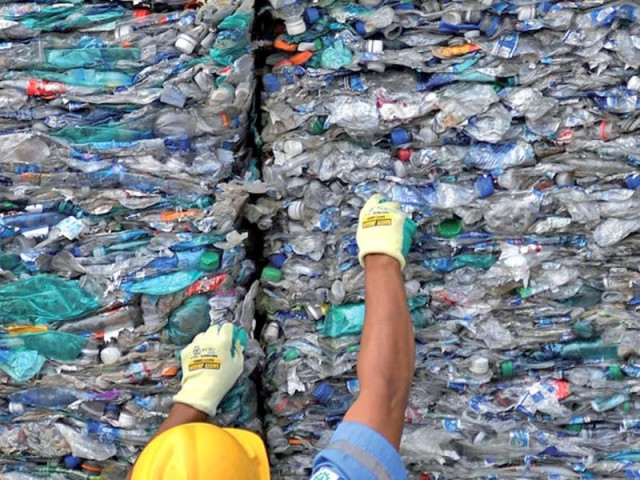Plastic waste – an uphill battle
As Environment Day comes, govt should frame rules to ban plastic waste imports

According to the Sustainable Development Report 2019, Pakistan stands at the 130th rank out of 162 countries with a score of 55.6 on the Sustainable Development Goals (SDGs) Index.
In contrast, regional countries like China (39), Thailand (40) and India (115) are at higher spots in the overall ranking and have made swift progress on achieving the SDGs.
While there is no specific focus of the SDGs on plastic pollution, SDG 12 (responsible consumption and production) and SDG 14 (life below water) are closely tied to the matter of tackling plastic waste.
In SDG 12, Pakistan has a score of 92.1, just lagging behind India (94.5) but has fared quite better than China (82) and Thailand (79.5). However, in SDG 14, Pakistan, with a score of 47.6, is trailing both India (51.2) and Thailand (54.7).
These regional countries, which are ahead of Pakistan in the SDGs Index, have imposed a ban on the import of plastic waste keeping in view its environmental and health hazards. As a result, Pakistan has become a dumping ground for plastic waste, mainly from the United Kingdom, Belgium, Canada, Germany and Saudi Arabia.
Between January 2019 and April 2020, Pakistan imported around 65,000 tons of plastic waste. In 2018, the country’s plastic waste imports surged 30% to nearly 47,000 tons.
In 2017, the imports swelled more than 200% to approximately 36,000 tons as compared to the previous year.
According to experts, owing to ineffective implementation of an already relaxed Import Policy Order and absence of extensive testing by inspection agencies, as defined in the Basel Convention, Pakistan is even importing hazardous plastic waste in the form of powder, granules and flakes.
These end-of-life and contaminated plastic waste imports include used sewerage pipes, chemical containers and other hazardous material.
Pakistan itself produces an estimated seven million tons of plastic waste every year. Most of this is not recycled and ends up in landfills as the country does not have a well-developed waste management system and its recycling companies do not comply with global practices.
The import of plastic waste is, therefore, aggravating Pakistan’s pollution problem and posing immense environmental and health risks to the country’s citizens.
Before the issuance of the next SDGs progress report, it is hoped that the government stakeholders concerned will work closely to introduce stricter environmental standards and regulations in an effort to put a ban on plastic waste imports.
“Without this action, Pakistan is likely to lag behind its neighbours in the achievement of SDGs,” the report said.
Published in The Express Tribune, June 5th, 2020.
Like Business on Facebook, follow @TribuneBiz on Twitter to stay informed and join in the conversation.


















COMMENTS
Comments are moderated and generally will be posted if they are on-topic and not abusive.
For more information, please see our Comments FAQ